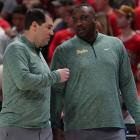
There is no movement at the top of Monday's Bracketology again after another rough weekend for highly rated teams.
No. 1 seed Houston lost at TCU for its second consecutive road loss in Big 12 play. The other three top seeds managed to win this weekend. Purdue is the No. 1 overall seed, followed by Kansas, the Cougars and UConn.
Bracketology top seeds
Check out Palm's latest bracket and full field of 68 at the Bracketology hub.
Big 12 loads up on Quad 4 teams
One of the hard things about doing January brackets is that each team's nonconference schedule is about half of its total schedule and the strength of those nonconference schedules widely vary.
The Big 12, for example, seems to have a conference rule that requires its teams to play as many Quadrant 4 teams (defined by the NCA A NET ratings system as a game at home vs. a team ranked No. 161-353, on a neutral court vs. a team ranked 201-353 or an away game vs. a team ranked No. 241-353) as possible. OK, I'm sure it's not a rule or Kansas would get fined every year. However, Big 12 teams have played an average of SEVEN Quad 4 teams this season. That is one-and-a-half more than the average for any of the other major conferences.
It seems like every Big 12 team I am trying to evaluate for the bracket has at least eight Quad 4 games. Houston, Oklahoma, Iowa State, BYU, Texas, Texas Tech and Cincinnati all have played at least eight and TCU has seven. Those that have done more to make up for that are higher in the bracket than the others and some are not in the bracket at all yet.
It's not just the Big 12. Two Mountain West teams with really good records are out of the bracket primarily because of poor nonconference schedules. Nevada is just 2-2 in Quad 1 and 2 games because the Wolf Pack has 10 nonconference games evenly split between Quads 3 and 4. New Mexico played 10 Quad 3 and 4 games also, but seven in Quad 4. Those teams will also get some Quad 4 conference games, so playing especially soft nonconference schedules could come back to bite them when March rolls around.
We see borderline teams get left out of the bracket almost every year because they could not make up for the damage done to their resume by a lousy non-conference schedule. This year will likely be no different.





























